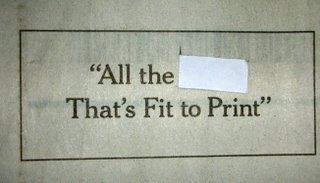Without Fear or Favor

Adolph Ochs once owned The New York Times and coined one of the best mission statements ever for a publication: "Without Fear or Favor." Cynics might claim that as an embarrassingly macho rallying cry for journalistic independence, but it works for me.
So, the confirmation today(registration required) that NYT Executive Editor Bill Keller held the story about the warrantless eavesdropping by the Bush administration before the November 2004 election (contradicting his earlier statements) raises a boat load of serious questions about the NYT and its sense of mission.
Keller had said in a message to readers on Dec 16, 2005 that the wiretapping article (that eventually won a Pulitzer and sparked intense criticism from President Bush and VP Cheney) had been held for "a year." But he tells NYT public editor Byron Calame that actually an article was being prepared before the presidential election and that the Bush administration had been part of the discussions about whether to publish or not. The decision to hold the article was made before the election.
Keller tells Calame, in effect, that the sourcing wasn't good enough to publish the article before election day. But new, more credible sources became available after November 2, 2004.
This still doesn't explain why Keller made an earlier misleading statement about how long the article had been held (He tells Calame "It was probably inelegant wording.") Nor does it explain why it was still held until 2005. And we have no detail into the veracity of the editorial debates that preceded the run up to the pre-election day decision. Calame's column says the debates about whether to publish involved the editorial heavyweights of the NYT, from publisher Arthur Sulzberger, Jr. to reporter James Risen himself. But the decision was Keller's alone.
What was he weighing? What beyond the journalism? What sources suddenly became available after election day?
Should an article critical of a president up for re-election run close to election day? Mr. Keller, in the interest of fairness, says any good editor would want to give that person time to respond. But the fact that the administration was already aware the story was under discussion tells me the Bush White House had ample warning. Given the 12 to 24 hour news cycle, this administration is no slouch in responding to 'bad' news.
Keller's 'fairness' reasoning, if that is all that was at stake, is really weak. How aggressive is the NYT, really? Is there a political calculus to what stories are printed and when? If a newspaper won't publish a story in wartime about potentially illegal acts by a sitting president who mislead the nation into war, when can it? I mean, what's the point in having a paper reporting this stuff?
First Judy Miller. Now this. Keller should go. Period. Readers, and voters, can make their own decisions when they have all the news that's fit to print.



0 Comments:
Post a Comment
<< Home